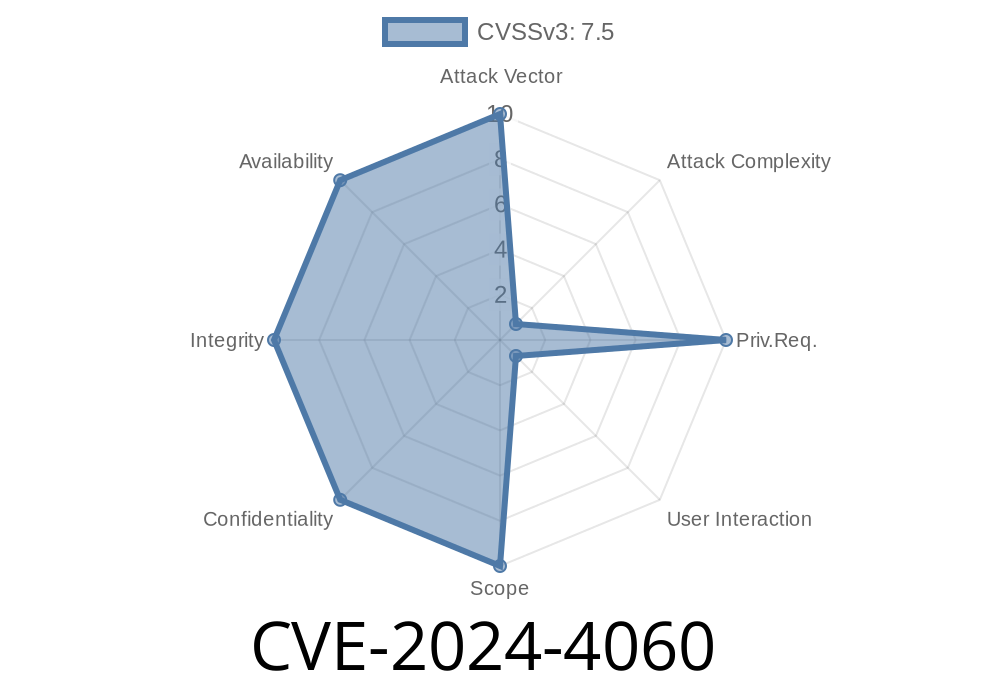In this post, we will dive into a potentially dangerous vulnerability found within the Google Chrome browser. Termed CVE-2024-4060, this vulnerability has been identified as a use-after-free heap corruption exploit that can be triggered by a remote attacker through a carefully crafted HTML web page. The affected component is Google Chrome's Dawn, a part of the browser that handles WebGPU functionality for graphics rendering.
Before we dive deep into the details, for those unfamiliar with the terms, let's briefly explain what a use-after-free and heap corruption vulnerability is.
Use-After-Free: This type of software vulnerability occurs when a program continues to use memory after it has been freed. Essentially, the memory is being accessed after it was meant to be returned to the system's memory pool, leading to unintended behavior and potentially severe consequences.
Heap Corruption: This issue arises when a program inadvertently writes data beyond its intended memory boundaries. This can lead to instability, crashes, or even malicious code execution.
Now that we have a basic understanding of the exploit in question, let's explore the details of this vulnerability.
Details of the Vulnerability (CVE-2024-4060)
The exploit lies within the Google Chrome browser's implementation of Dawn prior to version 124..6367.78. A remote attacker could potentially exploit heap corruption through a well-crafted HTML page, allowing them to gain unauthorized access to critical data and even execute malicious code.
The Chromium project has assigned this vulnerability a severity rating of "High," indicating the potentially severe consequences that can arise if proper remediation is not taken.
Below is a code snippet that demonstrates the vulnerability in action
<html>
<head>
<script>
async function run() {
const adapter = await navigator.gpu.requestAdapter();
const device = await adapter.requestDevice();
const src = new Uint32Array([, 1, 2, 3]);
const srcBuffer = device.createBuffer({
size: src.byteLength,
usage: GPUBufferUsage.COPY_SRC | GPUBufferUsage.COPY_DST
});
device.queue.writeBuffer(srcBuffer, , src);
const dst = new Uint32Array(src.length);
const dstBuffer = device.createBuffer({
size: dst.byteLength,
usage: GPUBufferUsage.COPY_SRC | GPUBufferUsage.COPY_DST
});
const encoder = device.createCommandEncoder();
encoder.copyBufferToBuffer(srcBuffer, , dstBuffer, , src.byteLength);
const commandBuffer = encoder.finish();
device.queue.submit([commandBuffer]);
await device.queue.onSubmittedWorkDone();
device.defaultQueue.readBuffer(dstBuffer, , dst).then(pointer => {
console.log('Pointer:', pointer);
});
}
</script>
</head>
<body onload="run()">
</body>
</html>
This code snippet demonstrates a simple use case of the WebGPU API. However, a malicious actor could easily modify this code to trigger the aforementioned use-after-free vulnerability in affected versions of Google Chrome.
Original References
For more detailed, technical information regarding this exploit, please refer to the following resources:
- Chromium Bug Report
- NIST National Vulnerability Database Entry
Mitigating the Exploit
To protect yourself from this vulnerability, it is strongly recommended that you update your Google Chrome browser to the latest version (124..6367.78 or later). As a general practice, it is essential to keep your software up-to-date and apply security patches as soon as they become available.
Conclusion
Heap corruption vulnerabilities such as CVE-2024-4060 are reminders of the importance of staying attentive to security updates and maintaining a well-secured system. These types of vulnerabilities can lead to unauthorized access, data breaches, and even the execution of malicious code by attackers.
By understanding the nature of this particular exploit and the techniques to address it, we hope to raise awareness about the criticality of software security and the need for ongoing vigilance in keeping our systems safe from potential threats.
Timeline
Published on: 05/01/2024 13:15:52 UTC
Last modified on: 07/03/2024 02:07:02 UTC
